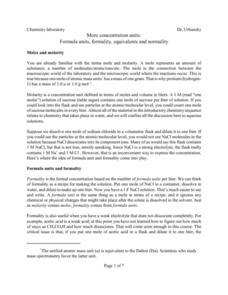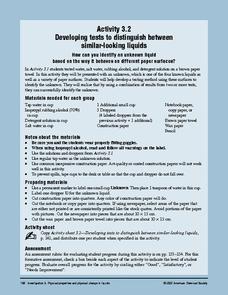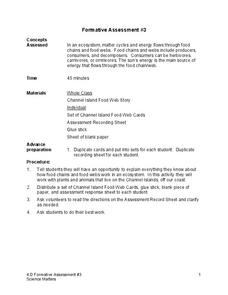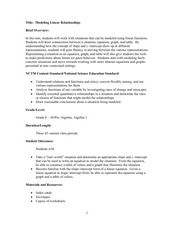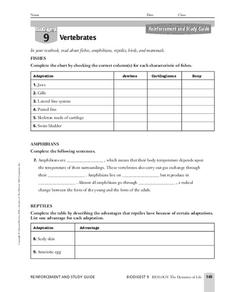Curated OER
Lost on Everest
What would it be like to be stranded on Mount Everest? Curious learners view a video clip, test common fabrics to see how they stand up to cold, and develop/answer discussion questions.
Curated OER
Formula Units
In this chemistry worksheet, students examine the concepts of mole and molarity in order to apply in the laboratory setting. The sheet includes in depth background information.
Curated OER
Introductory Bacteria and Virus Worksheet
Compare and contrast eukaryotes, prokaryotes, and viruses with a chart and a Venn diagram. Beginning microbiologists consider motility, reproductive ability, DNA content, and the presence of organelles. They write short answers to...
ARKive
Plants
Here is a one-hour activity that helps learners remember the parts of plants. Not only will the class learn about plant parts, they'll also discuss seed dispersal and plant growth. A celery experiment is used to show how plants obtain...
ARKive
Seasons in the Woods
Winter in the cold Northwoods of Wisconsin can be hard on animals that aren't adapted to the climate. Investigate the animals that are out and about even in the coldest winter temperatures as you and your class examine animal...
American Chemical Society
Developing Tests to Distinguish Between Similar-Looking Liquids
Each group talks about how to test unknown liquids based on their findings in the previous experiment. In this second of four activities, they test unknowns on wax paper, newspaper, and construction paper. As a stand-alone, this...
Pearson
Transcription
Teach young biologists the language of life with this series of worksheets on DNA. By working through these pages, students expand their understanding of genetics as they learn about the process of transcription and the...
Beyond Benign
Catalysts and Oxygen
Here is an engaging and hands-on lesson plan that allows high school chemists to demonstrate the effects of a catalyst on various chemicals. They garner knowledge of how reactants and products differ from one another, while...
New South Wales Department of Education
Plant Groups
Bryophytes can grow in temperatures just above zero degrees. This 17th installment in a series of 20 introduces learners to the five groups of plants: algae, bryophytes, pteridophytes, gymnosperms, and angiosperms. Classes then explore...
American Museum of Natural History
Buried Bones
Patience is the name of the game. Using Plaster of Paris and chicken bones, learners simulate an archeological dig site. They excavate the chicken bones over a period of several days using tools and a large amount of patience.
Polar Trec
Plankton Parents
Plankton are so abundant in the ocean they outweigh all of the animals in the sea. In this three day activity, groups discuss and become familiar with plankton, capture females, and look for egg production on day three.
Science Matters
Formative Assessment #3
Thirteen short-answer questions follow a brief food web activity in a formative assessment designed to test knowledge of ecosystems and the energy that flows through them.
Curated OER
Interpreting Data from Birdfeeders
What kinds of birds live in your area? Read a book about birds to your learners and explore their feeding patterns. Charts and graphs are provided in this three page packet, but consider assigning the basic questions if using with young...
Curated OER
Modeling Linear Relationships
Students graph lines using the slope and y-intercept. In this algebra lesson, students create data using tables and equations. They use their data to make predictions and draw conclusion.
Curated OER
Canada at a Glance
Stjudents examine the statistics in a Canadian publication for use in graphs. They develop their own questions based on tables and graphs found in this publication..
Curated OER
Different Dice
In this different dice worksheet, 9th graders read about the use of octahedrons as dice, review the probability with cubical dice, then answer the question of probability when rolling 2 octahedral dice.
Curated OER
Death by Particles
Emerging epidemiologists define relative risk and read an article about the effect of particulate pollution on the cardiovascular health of women. They record the relative risk values, graph them, and answer analysis questions. This is a...
Curated OER
Math Detective: Rounding Four Digit Numbers
In this rounding four-digit numbers worksheet, students read the multi-step story problem, complete the table and write an explanation of their answer.
Curated OER
Ocean Life: A Heavy Subject
Second graders examine The Learning Page Fact Files about ocean life and categorize the data by weight and group. They distinguish between fish, mammals, and invertebrates and which weigh the most and the least. Students record their...
Curated OER
Mendel's Laws of Heredity
In this heredity activity, students will review the work Mendel did on predicting how traits were passed down from generation to generation. Then students will review monohybrid and dihybrid crosses and Punnett squares. This activity has...
Curated OER
Acceleration 2
In this acceleration worksheet, students experiment with varying amounts of mass to observe the effects on the force needed to move an object. Students apply Newton's Second Law of Motion to describe the relationship between mass and...
Curated OER
The Living Environment
Learners use a spoon, clothespin, scissors, and toothpicks to simulate how animals get food in their environment. In this environment lesson plan, students learn about the adaptations animals make in order to survive.
Curated OER
Variation
Students recognize similarities and differences in plants. In this plants and animals lesson plan, students begin to classify living things by observable characteristics. Students watch clips from the Internet and play online games....
Curated OER
Vertebrates
For this vertebrate worksheet, students review the different adaptations for the 5 groups of vertebrates: birds, mammals, reptiles, amphibians, and fishes. This worksheet has 12 matching, 1 fill in the blank, and 7 short answer questions.

